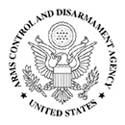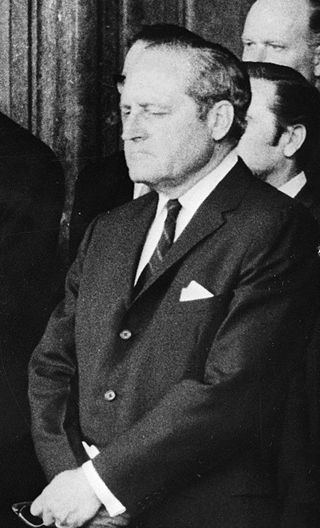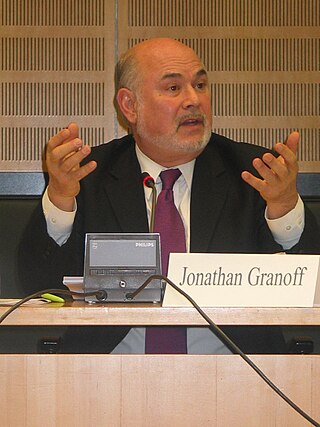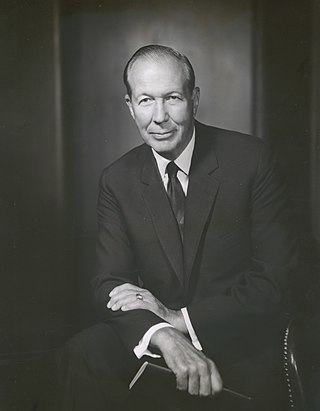Related Research Articles

The Treaty on the Non-Proliferation of Nuclear Weapons,commonly known as the Non-Proliferation Treaty or NPT,is an international treaty whose objective is to prevent the spread of nuclear weapons and weapons technology,to promote cooperation in the peaceful uses of nuclear energy,and to further the goal of achieving nuclear disarmament and general and complete disarmament. Between 1965 and 1968,the treaty was negotiated by the Eighteen Nation Committee on Disarmament,a United Nations-sponsored organization based in Geneva,Switzerland.

Nuclear proliferation is the spread of nuclear weapons,fissionable material,and weapons-applicable nuclear technology and information to nations not recognized as "Nuclear Weapon States" by the Treaty on the Non-Proliferation of Nuclear Weapons,commonly known as the Non-Proliferation Treaty or NPT. Proliferation has been opposed by many nations with and without nuclear weapons,as governments fear that more countries with nuclear weapons will increase the possibility of nuclear warfare,de-stabilize international or regional relations,or infringe upon the national sovereignty of nation states.

Nuclear disarmament is the act of reducing or eliminating nuclear weapons. Its end state can also be a nuclear-weapons-free world,in which nuclear weapons are completely eliminated. The term denuclearization is also used to describe the process leading to complete nuclear disarmament.
Arms control is a term for international restrictions upon the development,production,stockpiling,proliferation and usage of small arms,conventional weapons,and weapons of mass destruction. Historically,arms control may apply to melee weapons before the invention of firearm. Arms control is typically exercised through the use of diplomacy which seeks to impose such limitations upon consenting participants through international treaties and agreements,although it may also comprise efforts by a nation or group of nations to enforce limitations upon a non-consenting country.
William C. Potter is Sam Nunn and Richard Lugar Professor of Nonproliferation Studies and Founding Director of the James Martin Center for Nonproliferation Studies at the Middlebury Institute of International Studies at Monterey (MIIS). He also directs the MIIS Center for Russian and Eurasian Studies.

Jon Wolfsthal is an American security analyst currently serving as director of global risk at the Federation of American Scientists.
Richard Barlow is an American intelligence analyst and a former expert in nuclear non-proliferation for the US Arms Control and Disarmament Agency,the Central Intelligence Agency,and the Department of Defense. He lost his job and was subjected to a campaign of persecution and intimidation after he expressed concern to his managers in the US Department of Defense over testimony to congress that he believed to be false about Pakistan's nuclear weapon program during the presidency of George H. W. Bush. Since then,he has had occasional contract work for various federal agencies including the CIA,the State Department,the FBI and Sandia National Laboratories. In 2013 he had been unemployed since 2004 when his job at Sandia had been eliminated. "If they had busted those [Pakistani] networks," he told journalist Jeff Stein,"Iran would have no nuclear program,North Korea wouldn't have a uranium bomb,and Pakistan wouldn't have over a hundred nuclear weapons they are driving around in vans to hide from us."

The U.S. Arms Control and Disarmament Agency (ACDA) was an independent agency of the United States government that existed from 1961 to 1999. Its mission was to strengthen United States national security by "formulating,advocating,negotiating,implementing and verifying effective arms control,nonproliferation,and disarmament policies,strategies,and agreements."

Gerard Coad Smith was an American attorney and defense expert who served as the chief U.S. delegate to the Strategic Arms Limitation Talks (SALT) in 1969 and the first U.S. Chairman of the Trilateral Commission. He was awarded the Presidential Medal of Freedom on January 16,1981 by President Jimmy Carter.

Jonathan Granoff is an American lawyer,screenwriter and lecturer,widely known as President of the Global Security Institute.
The International Conference on Nuclear Disarmament took place in Oslo on 26 and 27 February 2008. It was organized by The Government of Norway,the Norwegian Radiation Protection Authority in collaboration with the NTI and the Hoover Institute. The Conference,entitled "Achieving the Vision of a World Free of Nuclear Weapons",had the purpose of building consensus between nuclear weapon states and non-nuclear weapon states and about the importance of all the actions in the NPT.
The 13 steps are identified in a paragraph of the Final Document of the 2000 Review Conference of the Nuclear Non-Proliferation Treaty,providing a set of 'practical steps for the systematic and progressive efforts to implement Article VI of the Treaty on the Non-Proliferation of Nuclear Weapons'. Article VI is the part of the Treaty that provides for disarmament,including nuclear disarmament.
The International Luxembourg Forum on Preventing Nuclear Catastrophe —is an international non-governmental organisation uniting leading world-renowned experts on non-proliferation of nuclear weapons,materials and delivery vehicles.
Iran convened a conference titled "International Disarmament and Non-proliferation:World Security without Weapons of Mass Destruction" on 17 and 18 April 2010 in Tehran. The theme of the conference was Nuclear Energy for All,Nuclear Weapons for No One.
The 2010 Review Conference for the Treaty on the Non-Proliferation of Nuclear Weapons (NPT) was held at United Nations Headquarters in New York City from 3 to 28 May 2010. The President of the Review Conference is Ambassador Libran N. Cabactulan of the Philippines. UN Secretary-General Ban Ki-moon used the opening of the conference to note that "sixty five years later,the world still lives under the nuclear shadow".

Paula Adamo DeSutter was United States Assistant Secretary of State for Verification,Compliance,and Implementation from 2002 to 2009.

Christopher Ashley Ford is an American lawyer and government official who served from January 2018 until January 2021 as Assistant Secretary of State for International Security and Non-Proliferation. He was nominated to that position by President Donald Trump,and confirmed unanimously by the U.S. Senate on December 21,2017. After October 21,2019,Ford also,by delegation from Secretary of State Michael Pompeo,performed the duties of the Under Secretary of State for Arms Control and International Security until his resignation from the Department of State on January 8,2021.
George Bunn was an American diplomat,lawyer,and nonproliferation expert. He drafted the legislation that created the U.S. Arms Control and Disarmament Agency (ACDA),was one of the lead U.S. negotiators of the nuclear Nonproliferation Treaty (NPT),served as Dean of the law school at the University of Wisconsin–Madison,and spent the last two decades of his career at the Center for International Security and Cooperation at Stanford University.

William Chapman Foster was an American businessman and high-ranking government official. He served as United States Under Secretary of Commerce and United States Deputy Secretary of Defense under President Harry Truman. Later,he served as the first United States Arms Control and Disarmament Agency director,under Presidents John F. Kennedy and Lyndon B. Johnson.
References
News
- ↑ "Thomas Graham". huffingtonpost.com. Retrieved 19 January 2013.
Web
- ↑ "Thomas Graham". U.S edition. www.huffingtonpost.com. Retrieved 19 January 2013.
- ↑ "Thomas Graham". Company. ltbridge.com. Retrieved 20 April 2018.
Book
- ↑ Graham Jr., Thomas (2002). Disarmament Sketches. United States: University of Washington Press. pp. 16–18, 62, 63. ISBN 0-295-98212-8.
- ↑ Graham Jr., Thomas (2002). Disarmament Sketches. United States: University of Washington Press. p. 29. ISBN 0-295-98212-8.
- ↑ Graham Jr., Thomas (2002). Disarmament Sketches. United States: University of Washington Press. p. 4. ISBN 0-295-98212-8.
- 1 2 3 Graham Jr., Thomas (2002). Disarmament Sketches. United States: University of Washington Press. p. 362. ISBN 0-295-98212-8.